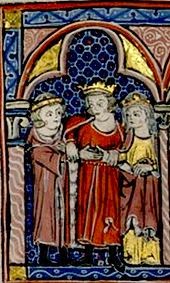The Kingdom of Jerusalem, Christmas Eve, 1212
Lord Hughes, his wife and his father, accompanied by an escort left for Acre
shortly after dawn broke on a clear, crisp Christmas Eve. The remaining
household worked hard to finish decorating the hall with greens and to get the
giant Yule log, imported all the way from the forests of Byzantium
Father
Claude expressed his envy for the journey they would make. “If I did not have
to hold Mass for the remaining household,” he insisted, “I would come with you.
It would not surprise me if you saw angels. You must promise to report all you
see and hear!”
“Gladly,” Blanche assured the enthusiastic young priest.
Father Claude had come out to Palestine
“You
must dress warmly, my lady,” Abelard warned her. “It is far colder in the upper
pastures than here.”
Blanche
looked over to him, but he looked down at his dinner and would not meet her
eye.
After
dinner, Claire helped Blanche change and prepare for her night in the pastures.
For the last time, Claire tried to talk Blanche out of it. “Are you sure you
want to do this?”
“Yes,
I am,” Blanche answered definitively as she pulled her heaviest wool shift on
over her head. As her head emerged, she looked straight at Claire and saw the
worried look in the older woman’s eyes. “Claire, I want the truth―no nonsense
about lions and hyenas and the untrustworthiness of Jews. Why don’t you think I
should spend the night up in the pastures?”
Claire
sighed and fussed with the wool stockings she was preparing to help Blanche
into. “If you’d been there … He was so angry―so suddenly angry. It
frightened me.”
Blanche knew what her maid was referring to.
The day Abelard had been found delirious with fever, Claire had come to Blanche
with a guilty conscience. She didn’t quite know how, but she sensed that his
illness had something to do with the confrontation they had had, so she had
confessed to Blanche what had passed between them.
Blanche
had assured her repentant friend that she was not to blame for Abelard’s illness,
but one thing was clear to her: Abelard had said he was not the man he’d been
before, not the youth she’d loved, and then had gone out to do a slave’s work
in the pouring rain. Blanche’s intuition said that he was ashamed of what he’d
become and considered himself inferior to her, as he had never been when her
father scorned him. She had mentally reviewed all that he had said and done
since her arrival, and concluded that
his actions might have been motivated as much by shame as by scorn. But she had
no intention of admitting her suspicions to Claire, just in case she was wrong.
“He
comes from a family of hot-tempered men, Claire. Don’t you remember how his
father once struck Abbot Beranger in some dispute over lands? His brother is
said to have broken his own son’s arm in an argument. It is hardly fair to
expect Abelard to be without his family’s temper.”
“But
when you were young and gave him so many reasons to be angry with you, he never
lost control,” Claire pointed out. “Here he threw something―I think it was a
stool―after me! It crashed against the door just after I left.” Her face was
pale, and her fingers fussed nervously with the wool stockings.
Blanche
considered her for a moment, unsettled in spite of herself by such profound
concern. Claire had always championed Abelard in the past, and her change of
attitude made Blanche question herself. Was she trying to find excuses for
Abelard only because she wanted to believe he did not hate her? Yet he had
requested “Ahi, Amours”! To say he loved her even if they were separated? Or to
say his love of God took precedence still? But he had not taken a monk’s vows,
and since their return from the pilgrimage, he had not once been overtly rude.
On the contrary, he had shown her a dozen little courtesies when he thought no
one would notice.
“What
are you afraid he’ll do to me, Claire?”
“I
don’t know,” Claire admitted in a whine of despair. “I don’t know. But he was
so angry! He said to tell you he was dead. And then he went out and tried to
kill himself, didn’t he?”
Blanche
had not thought of it that way. Had he tried to kill himself? If they had not
found him, might he not have died? “And you think he now plans to kill us
both?” she queried incredulously. This might be the kind of thing that happened
in ballads, but she could not quite picture it happening in real life. Claire
looked a little sheepish. “No, nothing so dramatic, but what if he strikes you
or―or …”
“Rapes
me?”
“It
has happened before!” Claire pointed out defensively, before Blanche could
dismiss this as an old woman’s fantasy. “Maybe he wants revenge for being
rejected. Or maybe, when he said he wasn’t the man he was before, he meant he
wasn’t as honorable as he had been as a young man.” Claire looked up at Blanche
with a pleading expression. She knew that Blanche was cleverer than she, and
she was afraid that Blanche would not listen to her because she could not argue
well. But her fear was genuine all the same.
Blanche
was too mistrustful of her own feelings when it came to Abelard to dismiss
Claire’s fears out of hand. Instead she mentally reviewed the past two weeks,
searching for some indication that would give credence to Claire’s suspicions.
But no matter how hard she tried, she found none. “Claire, do you honestly
think Lord Hughes would entrust me to someone he did not trust entirely?”
“No,”
Claire admitted, aware that it was impossible to explain something one did not
understand. “But what did he mean, then, about being different?”
Blanche
took her time answering. Sitting down and offering her legs to Claire for the
stockings, she reviewed all she had observed since her return from the
pilgrimage trip. In this past week she had watched Abelard very closely. She
had observed the diligence with which he served Lord Hughes and Lady Emilie.
“Claire, remember when we were young? Abelard was a bachelor knight with no
duties to anyone. He had not yet taken service with a lord and had been his own
master, free to ride from tournament to tournament in search of fame and
fortune. It made him seem more exotic than the others, who were all attached to
one household or another. And it was part of what made him exciting. But you
and I know that knight-errancy is fine for literature but is quite correctly
viewed with disapproval by society. It was as much his free-lancing as his
status as a younger son that made my father mistrust him. And my father felt
more kindly toward him the moment the Count of Poitou took him into his
service.”
“That’s
true,” Claire agreed, though she could not see what Blanche was getting at. Now
that the stockings were tightly bound with garters, both women stood, and
Claire brought Blanche’s gown.
“But
don’t you see, Claire? He’s not like that now. Now he’s a sober and responsible
official. He spends more time reading accounts than tilting, and his hands are
stained with ink rather than chain-mail oil.”
“But
that’s nothing to be angry about!” Claire pointed out.
“I
know,” Blanche answered simply. What had made Abelard more glamorous and
romantic to the maiden of sixteen had no appeal for the widow. On the contrary,
Blanche had had enough trouble with dishonest and incompetent stewards in her
lifetime to know how valuable a good seneschal was. Hughes and Emilie sang
Abelard’s praises, and everywhere Blanche looked she saw evidence of the
meticulous care Abelard took of whatever was entrusted to his keeping. “But
he may not know I know.”
Claire
stopped in the midst of lifting a heavy, quilted surcoat. What Blanche said
made sense, but it could not ease her fears. She had heard in Abelard’s anger
something more violent and more primeval than a mere concern that he was no
longer the carefree hero of their youth. Because she could not explain her
fears, however, she could only sigh in resignation and finish helping Blanche
prepare for her night out alone with Abelard.








